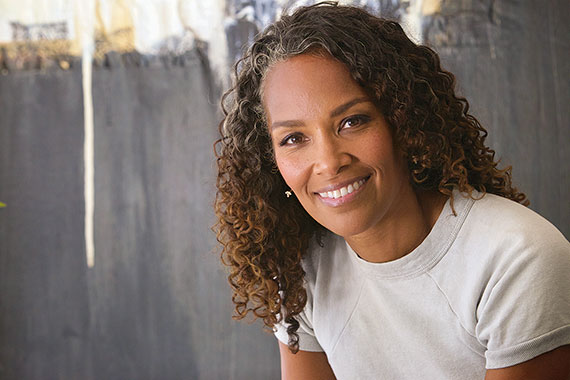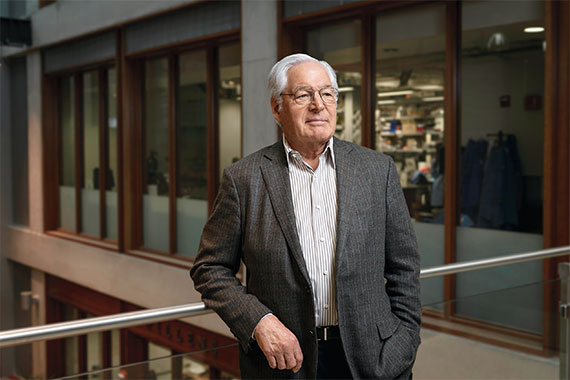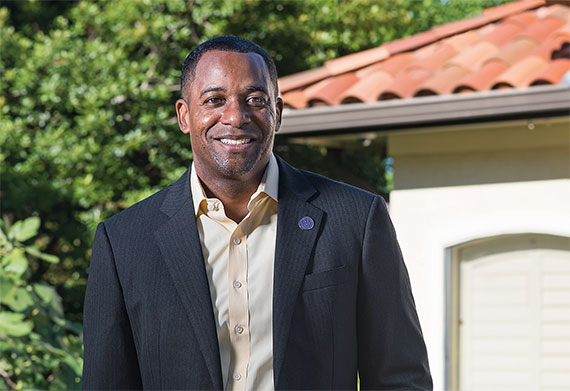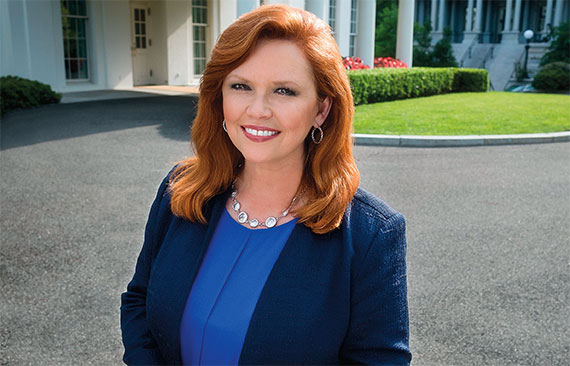Exceptional Directions
Join the medalists at two special events during Homecoming and Reunion Weekend. They will share their Northwestern experiences at the “President’s Alumni Medalist Panel: My Northwestern Direction,” a discussion led by President Morton Schapiro, from 1:30 to 3 p.m. on Friday, Oct. 6. Learn how to join this special event in person or via livestream. On Saturday, Oct. 7, the medal recipients will be honored on the field at the Homecoming game against Penn State.
Tell us what you think. E-mail comments or questions to the editors at letters@northwestern.edu.
Find Us on Social Media
Meet the 2017 Northwestern Alumni Medal recipients — four trailblazing alumni who exemplify the ideals of Northwestern through their life, work and service.

Photo by Phil Channing
Mara Brock Akil ’92: Making Her Voice Heard
As a Northwestern student Mara Brock Akil knew she’d found her calling soon after writing her first movie for Professor Delle Chatman’s screenwriting class. While walking in downtown Chicago one day, Akil thought nonstop about her characters. “I was alone, but I had so many companions with me,” she says. “I realized, ‘I am never going to stop thinking about my characters. Maybe I should ride this wave.’ ”
Akil took her love for character development to Los Angeles, where she moved in 1994 to launch her career as a writer and producer for television and movies. Following her early work on TV shows South Central, Moesha and The Jamie Foxx Show, she created hit shows Girlfriends, The Game and Being Mary Jane. Over the years, Akil has become known for her authentic portrayals of black women and for storylines that resonate with viewers.
“There’s nothing formulaic about Mara’s writing,” says Wendy Raquel Robinson, an actress who played street-smart “momager” Tasha Mack on The Game, which followed the women in the lives of professional football players. “She never wrapped up her episodes with a perfect ending, and that’s true in life. Mara showed vulnerable and complex characters who were so relatable to our audience.”
Record ratings for The Game helped cement Akil’s powerhouse status in Hollywood and pave the way for more black female characters in lead roles on major network shows, like Scandal and Empire, Robinson says.
Akil’s success and “truthful and responsible” storytelling have also solidified her impact in an industry where few women and women of color work as showrunners, says Traci Blackwell, senior vice president of current programs at the CW network and Akil’s longtime friend and colleague. (A showrunner manages the creative direction and oversees the production of a television series.) Akil was named by the Hollywood Reporter as one of the top 50 showrunners five years in a row.
“She’s a ceiling breaker,” Blackwell says. “Mara is one of those rare people in the world who shows young women and African Americans who aspire to be in the entertainment industry and in positions of power and influence what is possible.”
In 2013 Akil created Being Mary Jane, a drama that follows the life of a broadcast journalist, played by Gabrielle Union, and explores the statistic that 42 percent of black women will never marry. The critically acclaimed show was the first scripted drama in the BET network’s history and won Akil an NAACP Image Award for writing.
“Storytelling is like the campfire. ... That’s where we build tribe and community.” — Mara Brock Akil
“My desire to tell authentic stories has always been in me. It’s part of my mission,” says Akil, who was born in Los Angeles and raised in Kansas City, Mo.
After deciding to become a writer in high school, Akil sent her only college application to Northwestern, with a desire to attend the University’s highly rated journalism school. At the Medill School of Journalism, Media, Integrated Marketing Communications, Akil learned how to find the truth of a story — a lesson she uses to develop her characters and story arcs today.
“I remember there’s a ‘who, what, when, where and why’ in journalism, but it’s really the ‘why.’ Why are we doing the things that we do?” Akil says. “Whether we agree or not, answering that question is important to the humanity and authenticity of anyone.”
Akil will continue to answer this question as she brings stories to new audiences. In 2015 she and her husband and producing partner, Salim Akil, signed a three-year deal with Warner Bros. Television through their company, Akil Productions. Their show Black Lightning, which they produce with Greg Berlanti ’94, will premiere on the CW in 2018 and introduce the first African American family of superheroes to network television. The Akils, who have two sons, also created a “TV memoir” of their relationship called Love Is ___ that will air on OWN: Oprah Winfrey Network in 2018.
“Storytelling is like the campfire,” says Akil, who wants her company to be known for its ability to showcase human stories. “That’s where we get to know each other. That’s where we share. That’s where we get understanding. That’s where we build tribe and community.”

Photo by Jim Prisching
John “Mac” McQuown ’57: Pioneering the Data Revolution
After John “Mac” McQuown arrived on Wall Street in 1961 to launch his corporate finance career with Smith Barney & Co., he says he became “unnerved” by the subjective way investment managers picked stocks for their clients. Two years later, Wells Fargo Bank recruited him to San Francisco, where he pioneered the use of data analysis in the banking industry to create the first equity index funds — an invention that would change the way many people and companies invested their money.
Index funds marked the beginning of the passive investment era, when anyone could buy stock in a market index — such as the Standard & Poor’s 500 — and get increasing returns over the long term, along with lower transaction fees and costs. In 2016 index funds were one of the many passive portfolio strategies that represented 36 percent of the U.S. funds market, according to Morningstar Inc.
“The initial impact [of index funds] was to horrify everybody in the investment and management part of the business, to think you could actually construct a portfolio without any subjectivity at all,” says McQuown, who was called “one of the architects of the modern investing system” by Bloomberg Markets magazine.
Since leaving Wells Fargo in 1974, McQuown has built on his data-driven approach to launch more than a dozen companies in the financial services, technology and California fine wine industries.
“The initial impact [of index funds] was to horrify everybody in the business.” — John “Mac” McQuown
In 1981 he co-founded Dimensional Fund Advisors, an investment management company that helped make passive funds more accessible to individuals and companies and manages $497 billion in assets today. In 1989 McQuown and two partners formed KMV, where they created an analytical tool that predicted the likelihood of a company to default on its debts. The company’s pioneering work in assessing the profitability of corporate lending was used by hundreds of banks. KMV was sold to Moody’s in 2002.
While quick to admit that he has had failures along the way, McQuown says, “The key to success in life is adaptivity.”
Stephen Kealhofer, a business partner for more than three decades, has heard McQuown repeat this mantra before. “Mac is a truth seeker who doesn’t believe that he has found it, so it’s never about being right or being afraid to be wrong,” Kealhofer says. “It’s about ‘trying on’ the perspective, evaluating the evidence, modifying the working hypothesis and continuing on the path of discovery.”
McQuown’s interest in finance started when he was a Northwestern student. The Sandwich, Ill., native had spent summers working on his aunt and uncle’s nearby farm, where the need for equipment repairs led him to major in mechanical engineering. But Phi Delta Theta fraternity brother Bill Burnett ’54 convinced McQuown to take Professor Harry Guthmann’s corporate finance class, which set him on a different path. After serving two years in the U.S. Navy, McQuown earned an MBA from Harvard Business School and pursued a career in quantitative finance.
While McQuown still works with four of his companies, he says his “No. 1 goal” is to contribute to a solution to climate change. Influenced by his childhood on the farm, the oceans he crossed in the Navy and a long-held position on the Scripps Institution of Oceanography Advisory Board, McQuown directs his philanthropy and investments to support environmental innovations, including several McCormick School of Engineering research initiatives around nanotechnology, complexity and sustainability.
He also practices his message of conservation at Stone Edge Farm in Sonoma, Calif., where he lives with his wife, Leslie. The 15-acre organic farm produces heirloom vegetables, fruit, wine grapes, olives for olive oil, herbs, eggs and honey. Three years ago McQuown installed a microgrid, which generates electricity through a combination of solar power, a microturbine and a hydrogen storage and fueling station, and also contributes energy to the utility grid. As of May the farm was 90 percent energy self-sufficient. Eager to share his knowledge, he makes the operation’s intellectual property open and free to anyone who wants it, which has included numerous students, researchers, companies and government entities.
“There are two types of visionaries: the dreamers and those who don’t take ‘no’ for an answer,” says Jack Wadsworth, a longtime friend. “Mac is a visionary, and his life reflects that — and he does not take ‘no’ for answer.”

Photo by Jeff Fitlow
Milton “Chip” Morris ’92, ’04 MBA: Engineering Medical Breakthroughs
Milton “Chip” Morris invested equal effort in academics and athletics as a Northwestern undergraduate. The versatile Cleveland Heights, Ohio, native played wide receiver for the Wildcats and excelled in the demanding major of electrical engineering. But by senior year, he recalls, “it was fairly clear I was not going to have a dramatic, hall of fame career in the NFL — so I was looking for other things to do.”
Encouraged by mentors at Northwestern, Morris went on to pursue a doctorate in electrical engineering. In his graduate work at the University of Michigan he developed an algorithm that helped improve cardiac patients’ experiences with implantable defibrillators — small devices used to treat an irregular heartbeat. That breakthrough led to his first patent and first job in the medical device industry.
“I loved that I was able to take my engineering expertise and apply it to a medical technology that extends and improves lives,” says Morris, who now holds 30 patents.
As president and CEO of NeuSpera Medical Inc., a startup based in San Jose, Calif., he leads a team of engineers and scientists on the cutting edge of bioelectronic medicine.
NeuSpera makes miniaturized, injectable devices used to stimulate the nervous system for the treatment of disease. These so-called “electroceuticals” modulate electrical impulses in the body and trigger biochemical processes that help the body heal itself. The futuristic technology holds promise for patients with major illnesses, from diabetes to chronic pain to cancer.
“It’s an exciting area, and we think our technology is disruptive,” says Morris, citing NeuSpera’s efforts to develop implants that are 100 times smaller than other neuromodulation devices. Powered externally, the devices can be inserted into the exact location of the body where treatment is needed, with fewer side effects than pharmaceutical drugs.
“I loved that I was able to take my engineering expertise and apply it to a medical technology that extends and improves lives.” — Milton “Chip” Morris
Those who know Morris best say he has always blazed new trails. “Not only does he have a curious mind, but he has an insatiable appetite for knowledge, and that has fueled his success professionally,” says former U.S. Sen. William “Mo” Cowan of Massachusetts, a longtime friend.
“When I think of Milton, two words quickly come to mind — leader and pioneer,” adds Adam Karr ’93, who met Morris when they joined the fraternity Alpha Phi Alpha in the same year. Morris was a sophomore; Karr was a freshman. “He was somebody I immediately looked up to, not just because he was older but because of the strength of his character,” says Karr, a University trustee.
Before joining NeuSpera in 2015, Morris served in senior research, product development and marketing roles at Cyberonics, InnerPulse Corp. and Guidant Corp. (later Boston Scientific). While at Guidant, he enrolled in the Kellogg School of Management’s executive MBA program to add business, entrepreneurial and team-building skills to his deep knowledge of the medical device industry.
Morris and his wife, Renee, live in Houston with their four young children. Beyond work and family, he finds time to mentor high school youth through a program at his church called Boys’ Rites of Passage. Students who participate in the program need varying degrees of support, says Morris, and mentors remain involved for an extended period, often until their mentees finish college.
“This type of service, for me, is almost essential,” he says, both for work-life balance and to pass along the lessons he has learned to a new generation. “It’s a chance to engage with them and to find out what’s going on in their world.” At the same time, he says, mentors provide insights into their own decisions and concerns as they navigated adolescence, early adulthood and professional careers.
To stay connected with Northwestern, Morris serves on the McCormick School of Engineering Advisory Council. As a student, he says, “my expectations for myself and what I could become just exponentially increased. I’d like to provide whatever assistance I can to ensure that type of ‘Eureka!’ moment happens for as many students as possible.”

KELLY O’DONNELL ’87: Exemplifying Journalistic Excellence
Kelly O’Donnell follows the same ritual every day that she goes to the White House or the U.S. Capitol to report on a story for NBC News and MSNBC.
“As I walk through the gate, I pause and say to myself, ‘I’ve got to be on point today,’ ” says O’Donnell, a political correspondent. “This is a place where consequential things happen, and you can’t ever phone it in.”
O’Donnell has demonstrated this commitment to journalistic excellence throughout her career. An Emmy Award–winning reporter, she has covered some of the biggest stories of the past three decades, including the O.J. Simpson trial, Oklahoma City bombing, Sept. 11 attacks, Iraq War and four Olympic Games. O’Donnell also has traveled with candidates across seven presidential campaigns and covered U.S. Presidents George W. Bush, Barack Obama ’06 H and Donald Trump.
During the 2016 presidential race, she broke several stories, including Hillary Clinton’s election-night concession, the Democratic National Committee’s removal of its chairwoman and Indiana Gov. Mike Pence’s interview to become Trump’s running mate.
“The more that I am able to validate the experiences that people have in all spectra, the more effective I am at my stories.” — Kelly O’Donnell
Her preparedness, versatility, strong interview skills and sharp memory give her the ability to provide in-depth reporting, especially in live situations, says Alla Lora, who was O’Donnell’s producer at WJW-TV in Cleveland in the early 1990s and is now series producer at Washington Week on PBS.
“Kelly is a gifted storyteller who knows how to ask the right questions, focus on the facts and provide the context to help people understand complex issues,” Lora says.
Always drawn to the news and the world around her, O’Donnell pursued a bachelor’s degree in education with a focus on journalism and public policy as a Northwestern student. She honed her journalism skills at the student radio station, WNUR, and through an internship with Chicago’s CBS radio station WBBM.
She also showed her perseverance. When O’Donnell realized she would need an extra quarter to finish her coursework, she pleaded unsuccessfully with several administrators to let her walk across the stage at graduation. Undeterred, she sought out Northwestern President Arnold Weber ’95 H, who ultimately agreed to let her participate in the ceremony.
“In some ways, he was the first president I pestered with questions,” O’Donnell jokes.
After returning to her hometown of Cleveland to work at WJW-TV in 1987, O’Donnell provided live reporting at an Ohio prison riot that put her in the national spotlight. Since joining NBC as a correspondent in 1994, she has appeared on Today, NBC Nightly News, Meet the Press and Dateline NBC. Her reporting has taken her to 49 countries and 50 states.
Looking back on her career, O’Donnell highlights the 1995 Oklahoma City bombing as a story that has been especially meaningful to her. Over 22 years, she has covered the story from many angles, including the aftermath and Timothy McVeigh’s trial and execution; anniversaries of the bombing; and the long-term impact on the many families whose lives were affected.
“To cover a story from its earliest point when it was a shock to the system, to then see people over time and how the bombing has been a part of their lives is very powerful,” she says. “At every point, it’s a very human experience.”
In 2005 O’Donnell became the White House correspondent for NBC, and she added Capitol Hill to her beat in 2009. Despite increasing political tensions and attacks on the media, she works hard to show all sides of every issue through balanced reporting.
“I try to understand where people are coming from,” says O’Donnell. “The more that I am able to validate the experiences that people have in all spectra, the more effective I am at my stories, because people trust that if they talk to me, I’m really going to listen.”
Her goal is to stay “in the game” and continue to work as a journalist.
“Trying to get to the core of [a story], for me, is still very gratifying,” she says. “It’s what I want to keep doing.”



 Facebook
Facebook Twitter
Twitter Email
Email


